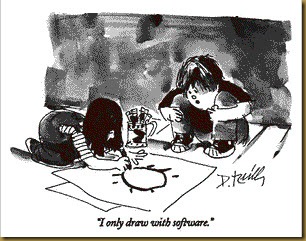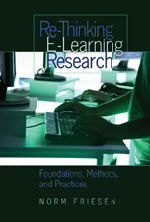This session is about people who are aware of software and software issues to provide insight into using these applications.
Kristi Jackson, the first speaker, is speaking about Transparency:
- QDAS
- Qualitative Standards Advocates
- Philosophy of the Mind
- Objectivity
- Constructionism
- Representation
- Feminism
- Qualitative Standards Critics
She is basing this on the Lave and Wenger CoP framework. This work came out of her reading of Denzin’s critique of transparency as a form of control. Not familiar with this, have to look it up as control issues are insidious with hegemonic issues. She also refers to Richard (2005, p. 191). These conversations have come up around issues around coding—is the process for how the codes and analysis done transparent and how it should or should not be done / studied. Transparency is often associated with linking theory to research and making it available for investigation. AERA has a report, “Standards for Reporting on Empirical Social Science Research,” which has caused quite a stir. Transparency with philosophy of mind seems to posit objectivity. Berger and Luckmann (1966) with constructionism. She does not think that the CoP of qualitative folks have done a sufficient work around the issue in and around transparency.
Silvana di Gregorio is presenting again, this time about E-Projects. I had the opportunity to speak with her after the last presentation, and I really like the work she is doing with software and Web 2.0 and qualitative research. E-projects are easily portable and consolidated in one place. Respect for persons, beneficence, justice all come from the Belmont Report, which then is an issue around how e-issues. For example, informed consent should tell people that those data will be electronically stored. In the US, there is a move to destroy data when its use is complete, and in the UK there is an emphasis to keep the data. Informed consent seems to be a large issue, especially for all of the issues. She mentioned the EU Safe Harbor Scheme, which is something to address issues of data portability is working on data between the US and the EU—I think I need to look more into this, as I will need to look into these issues more. What a rich area of investigation.
 My doctor prescribed me levitralab.com. Except, the pleasure that I had from the sex thanks to levitra, I have improved the general condition of the body, skin’s condition, the desire to have sex has increased. The only disadvantage is a pain in the lower back that was not so strong. The third speaker is Cesar A. Cisneros-Puebla, and challenges from the periphery with QDAS and issues. He showed a great cartoon from the New Yorker. He is showing interesting how qualitative software is seen in different ways around the world, such as FQS: Forum Qualitative Social Research in Germany (which I now review for!). I really like his global approach.
My doctor prescribed me levitralab.com. Except, the pleasure that I had from the sex thanks to levitra, I have improved the general condition of the body, skin’s condition, the desire to have sex has increased. The only disadvantage is a pain in the lower back that was not so strong. The third speaker is Cesar A. Cisneros-Puebla, and challenges from the periphery with QDAS and issues. He showed a great cartoon from the New Yorker. He is showing interesting how qualitative software is seen in different ways around the world, such as FQS: Forum Qualitative Social Research in Germany (which I now review for!). I really like his global approach.
While Cesar is speaking, I decided I want to get the image he used (just got it) and add some links. In this way, liveblogging is getting increasingly difficult since there is so much to look for.
Two of the other presenters did not attend, and this is allowing, for the first time in this very busy conference, for us to ask questions and have a discussion around this area.
There was a question about how the qualitative data analysis software is based around an English-based way of processing information (such as try to highlight an action or what is being looked for). This led into a discussion around standards with readability and how it works when being translated into other languages and how the images and even thinking about culture is significant. Reminds me of my work with health literacy.
 I just learned about a new 3-week online seminar that just began at SCoPE: Re-Thinking E-Learning Research. I purchased this text after reading about it earlier in the year, and this is a great opportunity to begin reading it, especially given that my doctoral studies are in E-Research and Technology Enhanced Learning. As I take such a broad view of what elearning and e-research are, this session may be just the thing I am looking for.
I just learned about a new 3-week online seminar that just began at SCoPE: Re-Thinking E-Learning Research. I purchased this text after reading about it earlier in the year, and this is a great opportunity to begin reading it, especially given that my doctoral studies are in E-Research and Technology Enhanced Learning. As I take such a broad view of what elearning and e-research are, this session may be just the thing I am looking for.
